Guide
How to Become a Project Manager
If you've got a passion for delegation, organization, and communication, then project management might be just the career for you.
You’ll put those passions and strengths to good use—creating real change within your business or organization.
But what exactly is project management? What role does a project manager play within a business or organization? What skills do you need to be an effective project manager? And how does someone become a project manager, anyway?
Here we explore each of these questions in depth so you have all of the information you need to understand whether or not project management is the career for you and—if it is—how you can turn your dream into reality.
Discover the value of a project management degree.
Looking to advance or start your project management career? A graduate degree could be the key. Download our free guide for insights and tips.
Get the guideWhat is Project Management?
Simply put, project management is the art and discipline of managing a project and all of its components from start to finish.
But as anyone who’s ever managed a project will tell you, this simple definition doesn’t capture the full scope of what project managers do.
Project management plays a necessary role in countless industries, from technology and software development to healthcare and pharmaceutical research, business and nonprofit work, construction management, and everything in between.
All projects, regardless of industry, can be broken down into roughly the same five processes, or phases:
- Initiation
- Planning
- Executing
- Monitoring and Controlling
- Closing
Project managers have an essential and indispensable role to play in each of these phases.

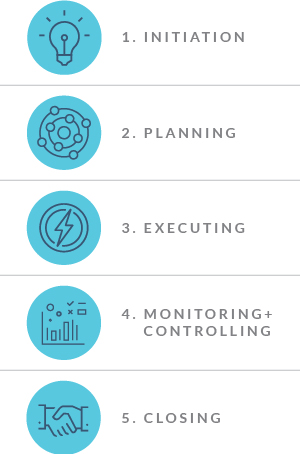
Step 1: Initiation
Before any project can begin, it must first be initiated.
During initiation, important groundwork is laid to determine whether or not a project can and should be pursued. This typically involves creating a business case that aims to justify the need (and value) of a project, as well as a feasibility study, which aims to understand how likely the project is to be completed if it is pursued.
Step 2: Planning
Once the project’s sponsors or stakeholders agree that a project should be pursued, the project enters into the planning phase.
It’s during this phase that the full scope of the project is formally drafted and documented. Ideally, this will include a thorough understanding of:
- The project’s scope.
- The project’s objectives and deliverables.
- The tasks necessary to complete each deliverable.
- The schedule for both individual tasks and the entire project.
- The budget, including an understanding of all project costs.
- Any risks associated with the project.
- Allocation of both internal and external resources.
- The project’s stakeholders and communication strategies.
- Project integration and change control processes.
Step 3: Executing
After a full plan is drafted and approved, the project is ready to be executed.
This involves completing the tasks needed to move the project forward, as well as hitting the key milestones documented in the project plan.
Exactly how the project is executed will depend on several factors, including which methodology is used to manage the project. Some of the most popular project management methodologies include:
- Agile
- Scrum
- Lean
- Waterfall
- Kanban
- Six Sigma
Step 4: Monitoring and Controlling
While the project is being executed, progress is also being monitored and controlled to ensure key milestones are being met.
This process typically involves:
- Regular communication between the project team and stakeholders involved in the project.
- Evaluating actual performance to established scope, cost, and schedule baselines.
- Weekly, monthly, and quarterly reporting to both the team and key stakeholders.
- Implementing change control processes to capture the changing realities of the project.
- Ensuring quality control and assurance as the project progresses.
- Cost control and allocation of resources.
Step 5: Closing
After the project has been completed, it must then be closed.
The closing process involves evaluating the project’s results compared to the objectives established in the project plan. It also includes ensuring all administrative tasks are completed, including closing contracts, paying external invoices, reallocating internal resources, and archiving records.
The Role of a Project Manager
While the exact role and responsibilities of a project manager will vary between organizations and industries, most project managers will find themselves responsible for the same general duties.
The most important of these responsibilities include:
- Regularly communicating with team members, usually through a mix of emails, phone calls, daily check-ins, and team meetings, in order to understand the status of the project and the progress being made on tasks.
- Issue identification and resolution to ensure that any roadblocks are addressed and removed so work can continue.
- Budgeting and cost control, including resource management and cost approval, the processing of invoices, and allocation/reallocation of resources as necessary.
- Communication and reporting to key stakeholders to ensure that they understand the progress being made on the project and any issues that develop.
- Team building to help team members focus on specific tasks and remain happy and productive as they work toward project completion.
Important Skills for Project Managers
With so many moving pieces to manage and keep track of, project management can be an incredibly complex field of work. Successful project managers possess a very specific set of skills that allow them to meet the demands of the job. These are known as soft skills and hard skills.
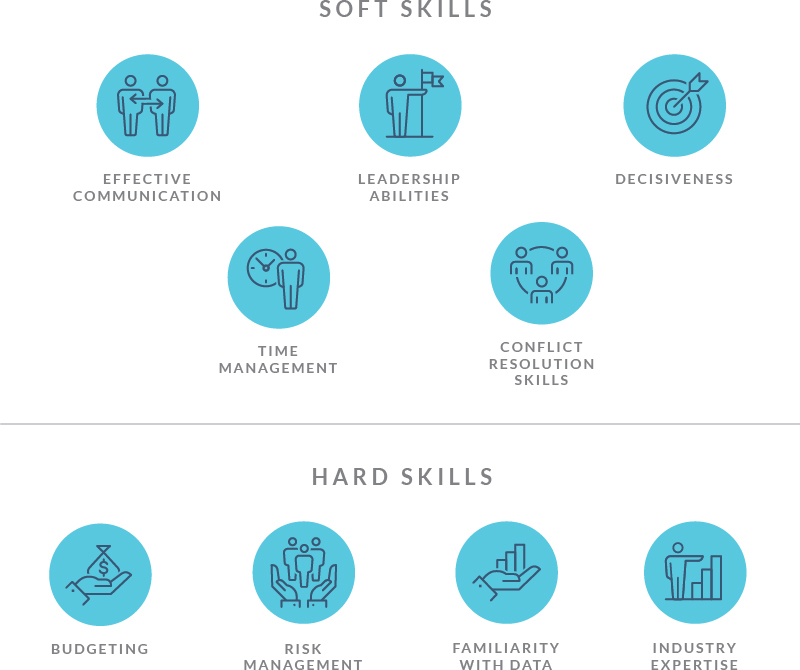
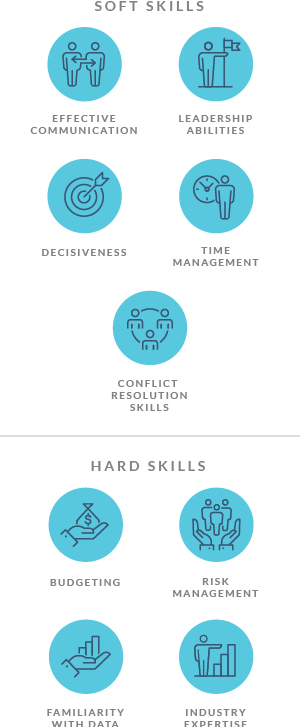
Soft Skills for Project Managers
These are also called people skills or interpersonal skills.
Because so much of project management involves managing people, it’s impossible to overstate just how important it is for project managers to develop and practice their soft skills. Though many believe soft skills are something individuals are born with, this isn’t the case. As with any skill, soft skills can be learned and practiced.
Some of the most powerful soft skills project managers can have include:
- Communication skills: The ability to communicate clearly and effectively is one of the most important skills in project management. Project managers use various tools and platforms to communicate with members of project teams, outside vendors, key stakeholders, and project sponsors. In addition to the basics like speaking and writing, effective communication also includes being able to understand and identify nonverbal cues like body language and tone of voice in order to properly manage teams.
- Leadership skills: Project managers must be able to use their leadership skills to communicate clearly and effectively, inspire, influence, motivate, and build a consensus among their team—especially through periods of high stress.
- Decisiveness: Just as it’s important to weigh the input and views of all team members, a project manager must also be able to summarize the discussion and make a clear decision when necessary to ensure that a project progresses.
- Time management: Project managers must be able to manage the time and efforts of their team members effectively to ensure all tasks are completed, key project milestones are hit, and the project moves along according to schedule. This involves having the foresight to anticipate challenges, building in adequate buffer time between tasks, and being able to reallocate resources as necessary.
- Conflict resolution: Throughout a project, there are bound to be situations when tensions flare and conflicts arise. This can happen between members of the team or between stakeholders. A project manager must be skilled at navigating these situations and defusing tensions for the good of the team, stakeholders, and project.
Hard Skills for Project Managers
Compared to soft skills, hard skills are often much more measurable and quantifiable and tend to relate more to specific processes.
Some of the most important hard skills for project management to develop include:
- Budgeting skills: Every step of the way, project managers are tasked with ensuring a project remains within its allocated budget by controlling costs and adjusting resources as required.
- Risk management: Project management isn’t just about managing people and resources—it’s also about managing risk. Identifying weak areas of the team and project, analyzing the likelihood and impact of a worst-case scenario, and putting contingency plans in place are some of the most important parts of project management.
- Familiarity with data: At the beginning of every project, many key performance indicators (KPIs) will be selected. These metrics will be benchmarked and monitored throughout the project to understand progress and, ultimately, whether or not the project leads to its desired outcome. Project managers are tasked with understanding and analyzing this data, as well as using the data to communicate to both their team members and the project’s key stakeholders.
- Technical expertise: To effectively manage a project, project managers must be proficient in their industry or domain. It is next to impossible to manage a project if you know little to nothing about the specifics involved in bringing it to fruition.
Career Outlook
If you’re wondering whether or not a career in project management is for you, consider these statistics recently gathered by the Project Management Institute (PMI):
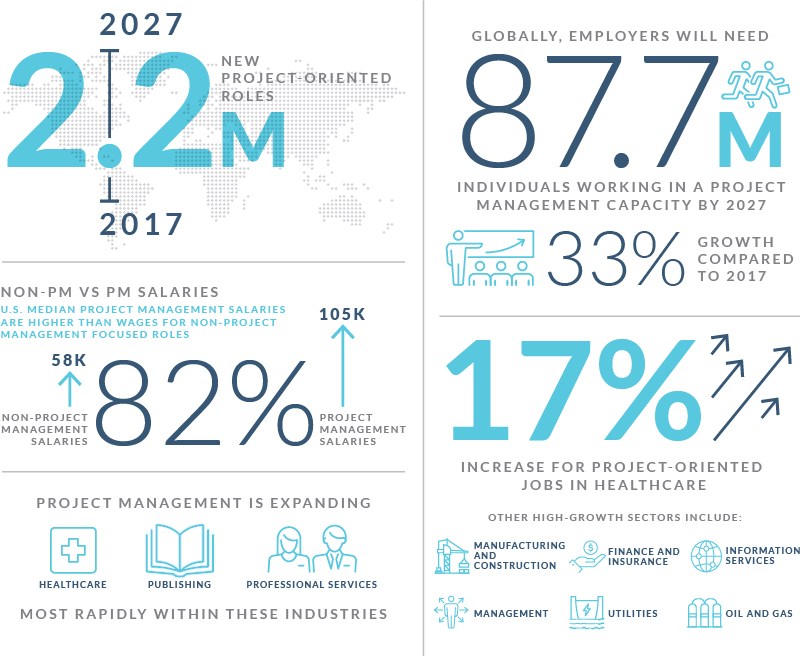

Specializing Your Project Management Career
While the career potential for project managers is already promising, those who specialize in a field can develop a more lucrative career.
In the U.S., the median salary for a project manager is $116,000 across all industries, with most project managers earning between $90,000 and $140,000. Professionals who further pursue program or portfolio management, however, often see an increased salary potential compared to more generalist project managers.
Project, Program, and Portfolio Management
At its simplest, project management involves the managing of a single project. But as organizations grow and operations become more complex, it’s not uncommon for multiple projects to be underway at the same time. In these more complex cases, project management may be viewed as three related, but different categories: projects, programs, and portfolios.
- A project is a temporary endeavor with a finite start and end, which is focused on creating a unique product, service, or result for a business.
- A program is a group of projects that are organized and managed in a coordinated way to ensure efficient use of resources and realization of shared objectives.
- A portfolio is a collection of programs and/or projects, which are managed together to achieve an organization’s strategic initiatives. Individual projects fall within programs, which then fall within portfolios.
Those who choose to declare an industry-specific specialization will also likely see a positive career impact. Being trained to handle the unique processes, regulations, and best practices of specific industries will help applicants stand out from the competition during hiring processes, and will likely help land them a coveted, specific role within the project management field.
The Different Paths to Becoming a Project Manager
Regardless of your current career, position, or past education, you can become a project manager if you decide it’s the career that you want to pursue. Exactly how you go about achieving this will, of course, depend on your career situation and which path makes the most sense for you.
Generally, most people follow one of two common pathways in becoming a project manager:
- The most straightforward path for those who know they want to become a project manager is to pursue formal education and training.
- The second path is more of a do-it-yourself approach. This is often followed by those who find themselves thrust into a project management capacity that they didn’t necessarily plan for.
We explore both of these paths below.
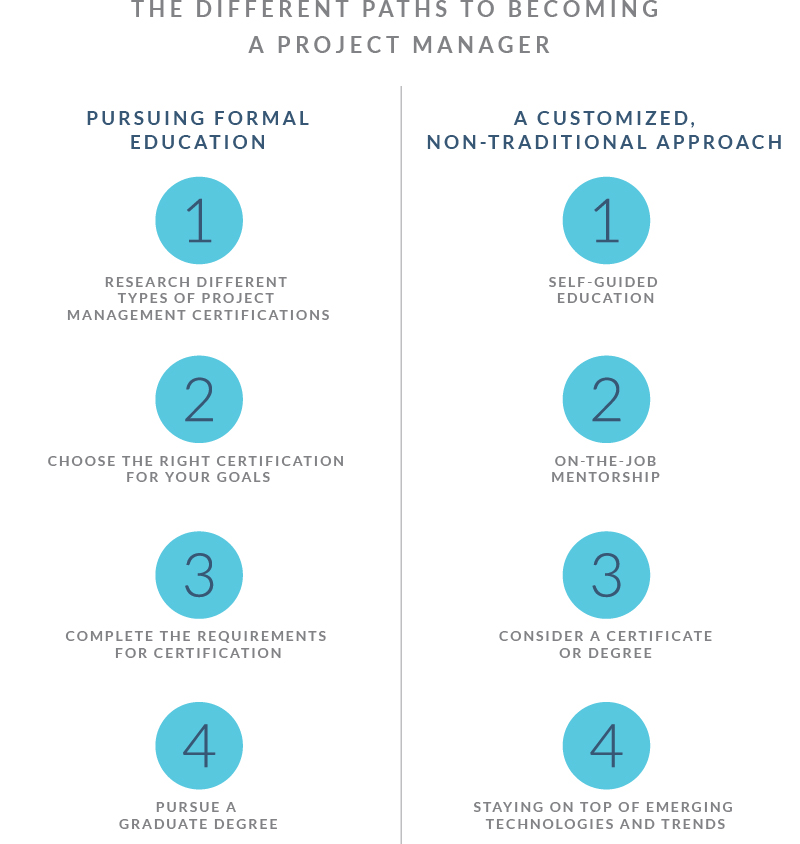
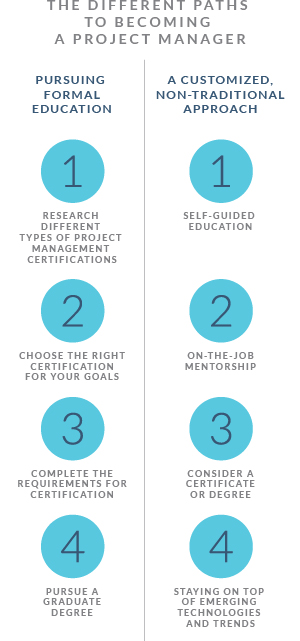
Pursuing Formal Education
For some people, the decision to become a project manager is a straightforward and conscious one.
Maybe a family member, friend, or acquaintance is a project manager, and you think you’d like the role. Perhaps you’ve spent some time in the workforce working on projects and have decided that you want the opportunity to lead projects instead. Maybe a trusted high school or college advisor told you that project management would be a smart career choice. Whatever the case, you know that you want to become a project manager—you just don’t know how to get there.
If this describes you, pursuing formal education and training in project management is likely the most efficient path to starting your career. Typically, this will entail earning the appropriate certifications and, potentially, an advanced degree.
Earning a Certification
While it’s possible to become a project manager without earning a certification, becoming a certified project manager has several benefits.
Earning your certification demonstrates to potential employers that you have the relevant knowledge, skills, and experience required to work in a project management capacity. It also makes it much easier to transition to a new role at a different organization (should you decide to do so).
But which certification should you earn?
There are many to choose from, which can make the decision less than obvious. Below are some of the more common certifications and who each may be best suited for.
Project Management Professional (PMP)®
By far, the PMP is the most commonly referenced and sought-after project management certification. Based on the methodology outlined in the Project Management Body of Knowledge (PMBOK), earning this certification will show employers that you have the skills required to manage the demands of most projects. It’s widely seen as the gold standard for project management certificates, particularly in the United States, Canada, and the Middle East.
To earn your PMP, you must first pass a 200-question, multiple-choice exam. To take the exam, you must meet several requirements:
- For those with a four-year degree:
- At least three years of experience working in a project management capacity
- At least 35 hours of formal project management education
- For those without a four-year degree:
- At least five years of experience working in a project management capacity
- 35 hours of formal project management education
Scrum
Scrum is a project management framework related to Agile. It’s often used to address the unique problems and challenges associated with software development. As such, if your end goal is to work in the software industry, Scrum may be a good choice.
There are currently six Scrum-related certifications offered by the Scrum Alliance:
- Professional Scrum Master
- Professional Scrum Product Owner
- Professional Scrum Developer
- Scaled Professional Scrum
- Professional Scrum with Kanban
- Professional Agile Leadership
Though less common than the PMP (there are currently 418,000 certified scrum professionals globally compared to more than 1,000,000 PMP certification holders), it is one of the fastest-growing project management certifications.
PRINCE2
PRINCE2 is a project management framework that was formulated and developed by the government of the United Kingdom, which emphasizes business justification, defining organization structure, flexibility, and a product-based planning approach. The name itself is an acronym coming from PRojects IN Controlled Environments.
Because of its prominence and origin in the U.K., PRINCE2 may be the ideal certification for those working in the U.K. and parts of Europe.
Earning an Advanced Degree
Though a master’s degree in project management isn’t always required for a project manager role, it’s becoming increasingly common. According to a recent report from Burning Glass Labor Insight, 34 percent of project management job postings prefer or require a graduate degree in addition to requiring PMP certification.
Even for job postings that don’t require an advanced degree, earning such a degree can bring many benefits, like making it easier to break into the industry and advancing in your career.
If you’re considering earning a master’s degree in project management, you may be wondering what an ideal program looks like. While there are no specific criteria that a degree must meet to provide value, some of the more important criteria you should use to evaluate your options include:
- Whether or not the faculty members you will be learning from have direct and recent experience working in the industry.
- Whether or not the program incorporates any kind of experiential learning or co-op experience that can translate into direct, hands-on opportunities.
- Whether or not the program offers a concentration that relates to the industry you hope to build your career in.
- Whether or not the program provides networking opportunities for students through industry partnerships and its alumni network.
“Falling Into” Project Management
Some individuals find the path to becoming a project manager isn’t quite so straightforward as the path outlined above—largely because it wasn’t a path that they intended to follow. They were hired for one role unrelated to project management (often that of a director, manager, or team lead) and then, over time, found themselves taking on more and more project management responsibilities.
For these “accidental” project managers, a number of unique challenges must be addressed, most of which are tied to a lack of formal project management training. Luckily, some steps can be taken to ease the transition into a project management role, even if it wasn’t the career you originally envisioned.
First and foremost, you should seek to fully and completely understand the task at hand:
- What are the goals and objectives of the project you have been charged with managing?
- What individual tasks, steps, or phases must happen to progress the project forward?
- What resources do you have at your disposal?
Armed with this knowledge, you’ll be better prepared to determine your strengths and what weaknesses need to be addressed.
For example, you may find yourself very comfortable with and capable of managing a team due to years of work as a general manager, but unsure of the processes involved in creating and maintaining a budget. Or perhaps budgeting is a strength, but you’ve never been responsible for such extensive scheduling.
By understanding your strengths and weaknesses, you can form a plan that will allow you to learn the skills and gain the experience that you need to be successful.
Exactly what this looks like will depend on your needs and personal approach to learning. For many accidental project managers, it will include a mix of self-guided education and on-the-job mentorship.
Self-Guided Education
Depending on how much experience you already have, it may be possible for you to shore up your weak spots through self-guided learning. There are many resources available that can help you do just that:
- The Project Management Body of Knowledge (PMBOK) can largely be accessed online and in printed format, helping you learn the basic framework involved in project management. Similar resources exist for PRINCE2 and Scrum.
- Online learning platforms like Pluralsight, Udemy, and Teachable can help you learn the basics for relatively little cost.
- Similarly, intensive training offered directly by the Project Management Institute can be an invaluable source of guidance.
On-the-Job Mentorship
In addition to any self-guided education you pursue, if you have access to mentorship opportunities either inside or outside your organization, it would be wise to leverage it. A trusted mentor (like a supervisor or co-worker) can prove invaluable as you find your footing in your new project management role. They can offer advice and guidance that can help you be successful.
Taking the Next Steps
Once you’ve learned the skills necessary to complete the job at hand, you may find that you truly enjoy the role of project management. If this turns out to be the case, going on to earn a relevant certificate and, eventually, an advanced degree like a master’s in project management can make it much easier to transfer to a similar role in a different organization.
After You’ve Made It
It’s important to note that your education and career development shouldn’t end simply because you’ve landed your first project management role.
By the very nature of the work, project management roles are often temporary. While many larger companies and organizations may employ a full-time project management team or professional, many smaller companies do not, and instead rely on contract workers whose employment ends when the project does.
Luckily, there are steps that you can and should take to ensure your continued employability and relevance. Earning an advanced degree or new certificate, maintaining existing certificates, and staying on top of emerging technologies, trends, and methodologies can all help.
Get your free guide on the value of earning your project management degree.
See how earning your degree can open doors, increase your salary, and unlock worldwide opportunities in almost every industry.





